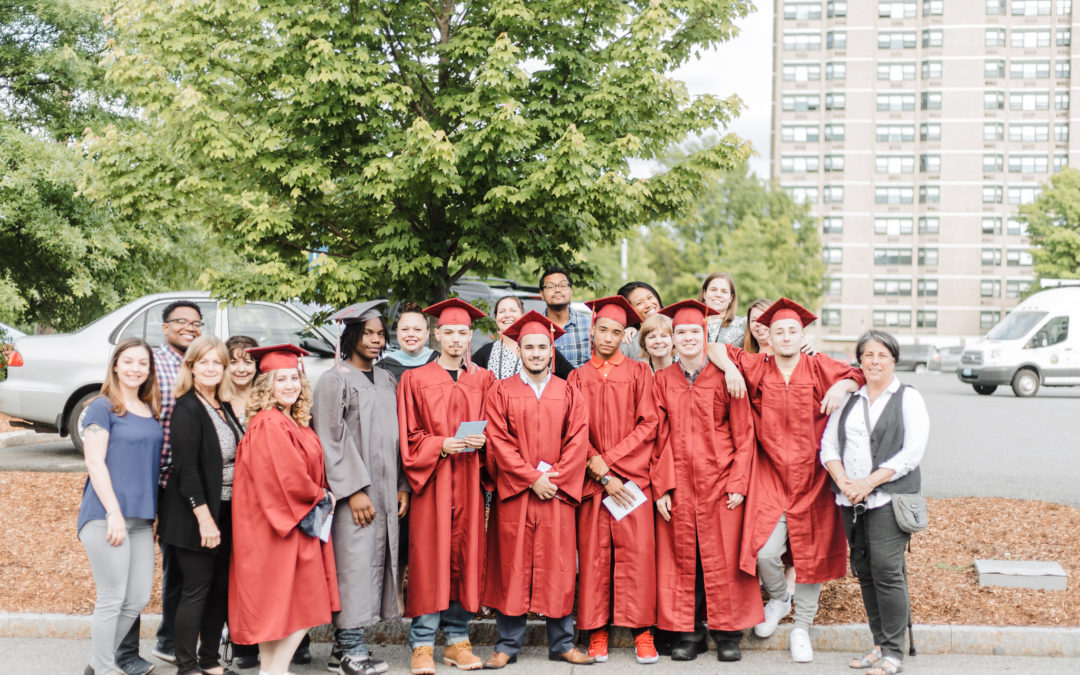First-generation college students face unique challenges that go beyond academics. Without family members who’ve gone through college themselves, these students often encounter barriers that make the journey to and through college more difficult. Fortunately, programs like Elevate New England offer critical support to first-generation students. With personalized guidance, leadership training, and practical resources, Elevate helps them not only reach college but thrive once they’re there.
What is a First-Generation College Student?
A first-generation college student is someone whose parents or guardians did not complete a four-year college degree. These students are often the first in their families to navigate the college application process, manage academic demands, and adjust to campus life. While their background can make their path to higher education more challenging, it also highlights their resilience and ambition, as first-generation students break new ground for themselves and their families, pursuing dreams that often come with significant obstacles. With the right support, first-generation students can thrive, building a foundation for both personal achievement and future generations to follow.
How Are First-Generation Students at a Disadvantage?
Many first-generation students face challenges rooted in a lack of access to information and support. College processes like applications, financial aid, and even course selection can be confusing without family members who’ve already experienced them. They may also feel pressure to meet family expectations or provide support at home, which can add stress. Without the same safety net that other students have, they’re more likely to struggle with decision-making and navigating campus life.
Common First-Generation College Student Struggles
First-generation college students often encounter obstacles that go beyond the typical challenges of higher education. One of the most significant hurdles is navigating unfamiliar systems. Without parents or family members who have been through the college process, tasks like understanding financial aid, registering for classes, and managing deadlines can be overwhelming. Many first-generation students also experience feelings of isolation—they may struggle to find peers who relate to their background and face imposter syndrome, doubting whether they truly belong.
In addition, balancing family responsibilities with academic demands can be a source of stress. Some students feel obligated to contribute financially or help care for younger siblings, pulling them away from focusing on their studies. This can lead to burnout, especially when combined with academic pressures. Finally, first-generation students often lack access to mentorship—they may not know where to turn for advice about internships, career development, or even choosing a major.
Academic Preparedness: Bridging the Knowledge Gap
For first-generation students, academic preparedness can be a significant hurdle. Many students haven’t had exposure to advanced coursework or guidance on developing effective study habits, putting them at a disadvantage when transitioning to college-level expectations. Closing this knowledge gap requires tailored, comprehensive support that addresses both academic and personal needs.
Programs like Elevate New England offer tutoring, mentorship, and leadership training that equip students with the skills and confidence needed to thrive in a college environment. These initiatives help students not only meet academic expectations but also develop the resilience and tools necessary for long-term success.
However, at Elevate New England we go beyond supporting students; we engage their families as well. Our teacher-mentors directly connect with families, meeting with them in their homes and maintaining open communication to help parents understand and navigate the academic journey alongside their child. By bridging this gap not only for students but also for their families, we foster a supportive community where students are encouraged and equipped to thrive.
Financial Challenges: Navigating Scholarships and Aid
For first-generation college students, navigating the financial side of higher education can be one of the most daunting tasks. Understanding the complexities of financial aid, scholarships, and student loans is challenging, especially without family members who have gone through the process. Many students may miss out on opportunities simply because they don’t know where to look or how to apply. This lack of knowledge can lead to taking on more debt than necessary or even delaying college plans.
Elevate New England plays a crucial role in helping students and their families overcome these financial barriers. Through personalized mentorship, Elevate guides students in finding and applying for scholarships, understanding financial aid packages, and making informed decisions about their educational investments. A dedicated Family Pathways Coordinator, with years of experience working directly for a local university, meets with students and their families to review college bills, ensuring they waive unnecessary charges and request all available aid and support.
By providing this comprehensive, hands-on assistance, Elevate empowers students to pursue higher education with confidence, knowing they have the resources and guidance to manage the financial aspects of college responsibly.
Cultural and Social Isolation: Building a Support Network
First-generation college students often face cultural and social isolation, feeling out of place in environments where most peers come from college-educated families. This isolation can lead to imposter syndrome, where students doubt their abilities or feel they don’t belong on campus. The lack of shared experiences with family or peers can make it harder to connect with others, leaving students without the support network many rely on during college.
Building a strong support network is crucial for overcoming these challenges. This is where Elevate New England can step in to fill this gap by fostering a sense of belonging through mentorship and leadership development. Teacher-mentors provide consistent guidance, helping students build confidence and connect with peers who share similar experiences. Through these relationships, students find a community of encouragement, ensuring they don’t have to navigate college life alone. By surrounding first-generation students with the support they need, Elevate helps them thrive both academically and socially.
Mental Health Challenges: Addressing Stress and Anxiety
The pressure of balancing academics, finances, and family expectations often leads to stress and anxiety for first-generation students. The pressure to succeed, balance family expectations, and navigate unfamiliar environments can weigh heavily on their well-being. Many students feel the added burden of being a role model for their families, which can intensify feelings of stress and burnout. Without a strong support system, it can be difficult to manage these emotional challenges.
Elevate New England recognizes the importance of mental health in student success. Through its dedicated teacher-mentors and trained social-emotional coach, Elevate offers not only academic guidance but also emotional support, creating a safe space where students can express their concerns and seek help. By equipping students with strategies to manage stress and develop coping strategies, Elevate empowers them to face challenges head-on, fostering resilience and emotional well-being as they pursue their academic and personal goals.
The Impact of These Barriers on First-Generation Students
The combination of academic, financial, social, and emotional barriers can hinder first-generation students’ ability to thrive in college. Many struggle to keep up academically or feel disconnected from campus life, which can affect their confidence and motivation. These challenges often lead to higher stress levels, lower grades, and a greater likelihood of dropping out. The weight of these obstacles can make college seem out of reach, but with access to the right support systems, these students have the potential not only to persist but to excel.
How to Support First-Generation College Students
Helping first-generation students requires a holistic approach. Offering academic support, financial aid, and fostering a sense of belonging can make a big difference. Providing mental health resources is also key to helping them manage stress and stay on track. Consistent, tailored support is essential in ensuring these students can navigate college successfully and reach their full potential.
Tailored Mentorship and Academic Support Programs
One of the most effective ways to support first-generation students is through mentorship and academic programs designed to meet their unique needs. Personalized mentorship can guide everything from course selection to managing academic pressures. Academic support services, such as tutoring and skill-building workshops, allow students to close knowledge gaps and gain confidence.
Financial Aid Resources and Scholarship Programs
Access to clear, comprehensive financial aid information is important for first-generation students. Navigating loans, grants, and scholarships can feel overwhelming. Offering dedicated support in understanding these options—along with assistance in applying for scholarships—helps ease this burden. Proper guidance ensures students can secure the financial resources they need, allowing them to focus more on their studies and less on financial stress.
Building an Inclusive and Strong Community
Creating a welcoming, inclusive environment is crucial for first-generation students to feel supported. Many struggle with social isolation, making it essential to foster a strong sense of belonging on campus. Peer networks, student organizations, and cultural groups provide opportunities for connection and community. When students feel included and valued, they’re more likely to engage fully in campus life and succeed academically.
Mental Health Support
Providing mental health resources is vital for helping first-generation students manage the stress and anxiety that often come with college life. Access to counseling services, wellness programs, and peer support can make a significant difference in maintaining their well-being. Prioritizing mental health ensures that students have the emotional resilience needed to navigate challenges and stay focused on their academic goals.
Elevate New England’s Role in Supporting First-Generation Students
At Elevate New England, we are committed to walking alongside first-generation students throughout their entire educational journey. From the moment they enter high school, we plant the seeds of possibility by introducing career speakers and offering leadership training. Our support doesn’t stop there—we guide students through every step of the college process, from completing their FAFSA and exploring scholarships to helping with college applications and essays.
We’re there on move-in day, helping students settle into campus life, and we continue to visit them throughout their college experience. Whether it’s assisting with financial aid renewals or simply offering encouragement during a difficult semester, Elevate remains a constant source of support, making sure these students have the resources and relationships they need to succeed.
How You Can Make a Difference
You can help first-generation students reach their full potential by supporting programs like Elevate New England. Your contribution provides crucial mentorship, academic guidance, and emotional support, helping students overcome obstacles and thrive in college. Every donation makes a direct impact, breaking down barriers and empowering these students to achieve their goals.

